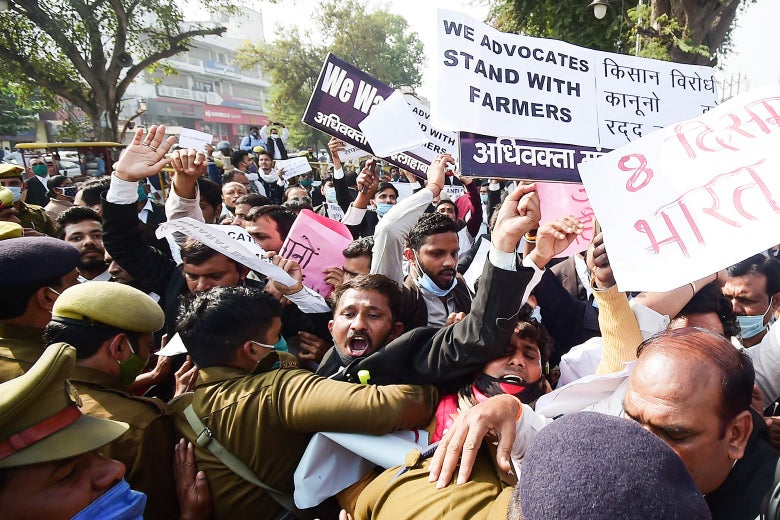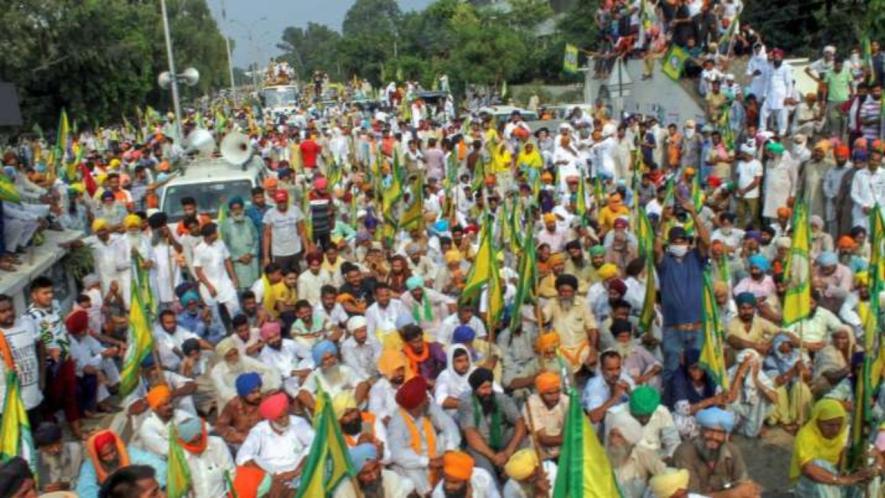Indian farmers intensify protests, testing Modi's promised market miracle
Issued on: 09/12/2020 -

A policeman stands in front of protesters during a nationwide strike called by farmers in Mumbai, India, on December 8, 2020. AFP - INDRANIL MUKHERJEE
Text by: Leela JACINTO
If Indian Prime Minister Narendra Modi’s government calculated that the pandemic would enable it to rush through reforms deregulating the agricultural sector, it was a miscalculation. Protesters have descended on the capital in an extraordinary mobilisation that presents the Hindu nationalist government with one of its biggest challenges.
If Indian Prime Minister Narendra Modi’s government calculated that the pandemic would enable it to rush through reforms deregulating the agricultural sector, it was a miscalculation. Protesters have descended on the capital in an extraordinary mobilisation that presents the Hindu nationalist government with one of its biggest challenges.
In late March, when Prime Minister Narendra Modi enacted the world’s toughest nationwide coronavirus lockdown, it sparked a deadly mass exodus from Indian cities to villages that shocked the nation. With no work, money or ability to survive in shutdown cities, millions of migrant workers took to their feet, setting off on the only path out of destitution available: long journeys back to their villages.
Rural India has consistently provided a counter narrative to the headlines trumpeting the country’s economic boom for decades. More than half of India’s 1.3 billion people still depend in some way on farming, but agriculture accounts for only 17 percent of the economy. Shrinking farm plot sizes, poverty, harvest uncertainties and indebtedness drive tens of thousands of Indian farmers to suicide every year and forces millions to migrate to cities.
But when a harsh lockdown was suddenly imposed, millions of Indians calculated that their villages – with tiny plots of cultivable land and informal networks of support and loans – were their only survival option.
Months later, some of the highways that led migrant workers in New Delhi to their villages to weather the lockdown are blocked by a reverse wave of farmers descending on the Indian capital to protest against three new farm laws.
Driving mud-splattered tractors, trailers, trucks and minivans packed with produce, pots, pans and blankets, tens of thousands of angry farmers, mainly from the northern states of Punjab and Haryana, have blocked the arterial roads into the country’s capital since November 26.
Setting up a giant sit-in, the farmers have braved the North Indian winter and defied government attempts to move them to outlying grounds, while protests have spread to neighbouring states, presenting one of the biggest challenges to the Modi administration since it came to power in 2014. India’s ruling Hindu nationalist government has a record of brutally stifling dissent. But farmers are a critical voting bloc in India and though the government and its supporters have tried to vilify and downplay the protests, they have not succeeded.
On Tuesday, railways and highways were blocked across India as farmers, trade unions and opposition parties answered a nationwide solidarity shutdown call. The widespread action saw Home Minister Amit Shah call for a meeting with farming leaders late Tuesday, ahead of a sixth round of talks on Wednesday.
Protesters are demanding a total repeal of the new laws, which make farmers sell their produce on the open market – including agribusiness corporations and supermarket chains – instead of through state-run institutions that guarantee a minimum price.
Modi maintains the “reforms are needed for development,” warning that, “we cannot build the next century with the laws of the previous century."
But as the curtain falls on a year that saw a pandemic ravage lives and livelihoods, India’s farmers are not persuaded by the promise of markets providing next-generation solutions to longstanding problems.
The resolve of the farmers and their extraordinary mobilisation, gathering supporters across sectors, has caught the Modi administration by surprise and is a cautionary tale for governments managing post-pandemic economic recoveries.
Using ‘the cover of the pandemic’
The latest crisis was sparked in September, when the government crammed complex legislative changes into three new laws and pushed them through parliament during an opposition walkout. They were passed as Covid-19 rages through India, with the country reporting the world’s second-highest number of cases.
“In the midst of a pandemic, laws with far-reaching impact on more than 50 percent of the population and on 100 percent of the food security of India were passed. The government used the cover of the pandemic to push through the laws, believing they would not be resisted. This has been bulldozed through parliament with no debate, no discussions,” explained Amandeep Sandhu, a writer who documented agricultural practices in Punjab in his book, “Panjab: Journeys Through Fault Lines”.
Since he came to power in 2014, Modi has opted for shock announcements with little preparedness that have left the populace scrambling to cope with the fallout – humanitarian and economic – of his populist moves.
On November 8, 2016, for instance, the prime minister made a surprise evening television appearance to announce that, starting after midnight, the nation’s 500 and 1,000-rupee notes would be demonetised or no longer considered legal tender. Economists estimate the move wiped at least one percent off India’s GDP and cost at least 1.5 million jobs.
Four years and a pandemic later, Indian farmers are sceptical of the Modi administration’s rushed, pro-business panaceas. “Neoliberalism has hollowed out state sectors. The health sector has collapsed, the education sector has collapsed. Now the government is fronting a crony capitalist move to agriculture,” said Sandhu.
‘Villainous’ state markets and middlemen
Economists agree India’s agricultural sector needs repair. The pressure of a growing population is shrinking land holdings, with more than 68 percent of farmers owning less than one or two hectares of land. Yields are often so low that economists estimate more than half of India’s farmers do not cultivate enough to sell.
But the urban manufacturing and service sectors have not produced enough jobs to get the working age population off the land. With unemployment rising in the aftermath of the pandemic, the situation is likely to deteriorate.
The new laws promise farmers freedom from “villainous and exploitative” government-regulated wholesale markets – called mandis – and commissioning agents who act as middlemen, managing sales, storage, transportation and even finance deals.
These middlemen – known as arhtias – also extend credit to farmers, serving as “bankers of the last resort” for desperate farmers, but levying crippling interest rates and repayment conditions in the process.
Loans for night trips to hospitals
News footage in recent days of farmers demonstrating to retain arhtias – viewed by the urban middle class as loan sharks driving the most hapless to suicide – has been another shocker for Indians not living off the land.
But Sandhu – who spent childhood vacations making trips to mandis with farming family members – explains that arhtias are part of the social and economic landscape in rural Punjab.
“They provide easily accessible credit for farmers that banks do not: if a sudden crop disease needs pesticides, a family illness in the middle of the night requires money to go to hospital, an urgent vet call for a sick cow... they play a pivotal role,” said Sandhu.
“What we need is regulation of interest rates and a recovery course for middle men who are extending credit. There is a need for ombudsmen,” he explained. “Now the entire system is being discarded for what, we don’t know. What we do know for sure is it would throw out millions of people from their livelihoods.”
Slick presentations with no answers
The government has attempted to downplay the protests as outbursts by poorly educated farmers who do not understand what’s in their best interests.
But in media interviews after successive rounds of talks, farm union members have proved to be better informed than the government.
In an interview with a Punjabi language TV station earlier this month, for instance, Rajinder Singh, vice president of a farmers union, explained how Indian Agriculture Minister Narendra Tomar displayed a slick presentation to union representatives at recent talks. But when asked about details of the laws, including implementation across states, the minister was unable to provide answers.
Tuesday’s nationwide blockade has triggered another round of negotiations, but with both sides unwilling to back down so far, few can predict how the latest crisis will end.
“The government is really worried because farmers are an important vote bank, North Indian farmers are unhappy and the government didn’t gauge their resilience. Now it’s a deadlock and it’s a matter of who blinks first,” explained Sandhu. “Modi sees himself as a strongman, he has never backed down on anything – it’s part of his strongman image that appeals to voters.”
But the people of Punjab and Haryana also have a long, celebrated history of toughness and bloody-minded intransigence that is gaining increasing respect in a country with a vast appetite for strongmen. The winter of discontent in North India looks set to be a long one.





















